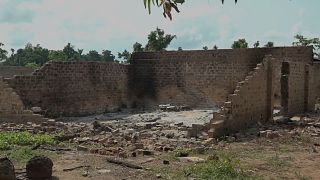Nigeria
Across Nigeria, devastating floods continue to ravage farmlands, destroy crops, and force tens of thousands of people to abandon their homes.
At least 300 people have died so far this year, and its believed that some 100,000 people have been displaced and are now living in temporary shelters.
The flooding has affected an estimated half a million people and destroyed infrastructure and farmland in 27 of Nigeria's 36 states and the capital city.
Farmers face tough times
In the farming town of Tiga, 70 kms outside of Kano in the north of the country, people have been particularly hard hit.
‘This field has become completely barren. After the flood subsided, the rice was killed. Then another disaster occurred. The bridge was washed away by the rain, which deposited sand and broken bitumen, covering the entire field. Now we don't even have a field to plant crops in,’ said Tiga rice farmer, Adamu Garba.
Others, like Kabiru Alassan, have been able to salvage part of their crop from the flooded paddies.
‘We were unfortunate to have experienced floods. The floods washed sand from the road and covered our paddy fields. This is the little we have left, by Allah's grace, which we are going to harvest. The rains have never been this destructive,’ he said.
Food security fears
While farmers are saying they have little choice but to face the challenges ahead, they are appealing to the authorities to help them deal with the dire situation.
‘We are calling on the government and international agencies to assist us. We are appealing to whoever can help to please show compassion and come to our aid, because we really need it,’ said Garba.
Like other farmers in the area, Garba said he has incurred huge losses and thought it would be unlikely that he would be able to harvest more than half a bag of rice this year.
‘We have to brace ourselves for post-harvest challenges because all the yield we were looking forward to has gone. We’re worried about what lies ahead. We rely on farming for our sustenance. It is what we produce in the rainy season that we eat for rest of the year. We use part of the harvest to pay for our upkeep and store the rest to feed ourselves,’ he said.
There are fears that the combined impact of the displacement of people, damage to infrastructure, and the destruction of farmlands, could lead to a disruption of food supply in Nigeria.











02:27
Hillside of white crosses fuels misleading story about South Africa farm killings
01:01
South Africa: Cyril Ramaphosa arrives at White House for meeting with Trump
01:33
South Africa urges white farmers to stay amid U.S. refugee controversy
04:46
Young Senegalese women market agribusiness on YouTube
04:00
Consecutive droughts Impact Morocco's livestock, reports Minister of Agriculture
01:57
Banki Livestock Market Reopens